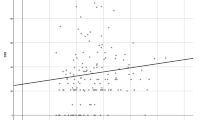Abstract
Objectives
To investigate the outcomes of 34 patients with intestinal failure secondary to advanced peritoneal malignancy on home parenteral nutrition (HPN).
Methods
A retrospective analysis of all known patients receiving HPN at any time between January 2012 and the 31st March 2020 registered in a high volume peritoneal malignancy surgical centre database.
Results
The median duration of HPN for all patients was 309.5 days (range 31–2198). Overall 11/34 went on to have multivisceral transplants. Of these 5/11 resumed normal oral intake off HPN, 3 died and 3 required ongoing HPN. Average time on HPN for patients with pseudomyxoma peritonei of appendix origin was 338 days (71–2198) compared with 90 days (31–260) in the group with more aggressive tumours.
Conclusions
HPN is feasible and effective in selected patients with pseudomyxoma peritonei as either a bridge to transplant or definitive treatment. As expected, patients with more aggressive tumours fare worse.
This is a preview of subscription content, access via your institution
Access options
Subscribe to this journal
Receive 12 print issues and online access
$259.00 per year
only $21.58 per issue
Buy this article
- Purchase on Springer Link
- Instant access to full article PDF
Prices may be subject to local taxes which are calculated during checkout

Similar content being viewed by others
References
Sugarbaker PH, Chang D. Results of treatment of 385 patients with peritoneal surface spread of appendiceal malignancy. Ann Surg Oncol. 1999;6:727–31.
Moran BJ, Cecil TD. The aetiology, clinical presentation, and management of pseudomyxoma peritonei. Surg Oncol Clin North Am. 2003;12:385–603.
Lord AC, Shihab O, Chandrakumaran K, Mohamed F, Cecil TD, Moran BJ. Recurrence and outcome after complete tumour removal and hyperthermic intraperitoneal chemotherapy in 512 patients with pseudomyxoma peritonei for perforated appendiceal mucinous tumours. EJSO. 2015;41:396–9.
Disney BR, Karthikeyakurup A, Ratcliff J, Jones J, Deel-Smith P, Fairhurst A, et al. Palliative parenteral nutrition use in patients with intestinal failure as a consequence of advanced pseudomyxoma peritonei: a case series. Eur J Clin Nutr. 2015;69:966–8.
Bozzetti F, Arends J, Lundholm K, Micklewright A, Zurcher G, Muscaritoli M. ESPEN guidelines on parenteral nutrition: non-surgical oncology. Clin Nutr. 2009;28:445–54.
Reddy S, Cecil T, Allan P, Georgios V, Smith A, Holdaway L. et al. Extending the indications of intestinal transplantation-modified multivisceral transplantation for end-stage pseudomyxoma peritonei. Transplantation. 2017;101:S89.
Author information
Authors and Affiliations
Corresponding author
Ethics declarations
Conflict of interest
The authors declare that they have no conflict of interest.
Additional information
Publisher’s note Springer Nature remains neutral with regard to jurisdictional claims in published maps and institutional affiliations.
Supplementary information
Rights and permissions
About this article
Cite this article
Swain, D., Mason, G., Yates, A. et al. Outcomes of home parenteral nutrition in 34 patients with intestinal failure from recurrent or progressive peritoneal malignancy of gastro-intestinal tract origin. Eur J Clin Nutr 75, 856–858 (2021). https://doi.org/10.1038/s41430-020-00810-4
Received:
Revised:
Accepted:
Published:
Issue Date:
DOI: https://doi.org/10.1038/s41430-020-00810-4
This article is cited by
-
Fear of Cancer Recurrence in peritoneal malignancy patients following treatment: a cross-sectional study
Journal of Cancer Survivorship (2023)


